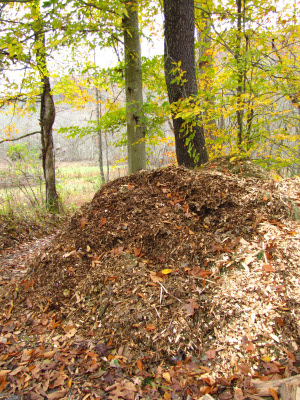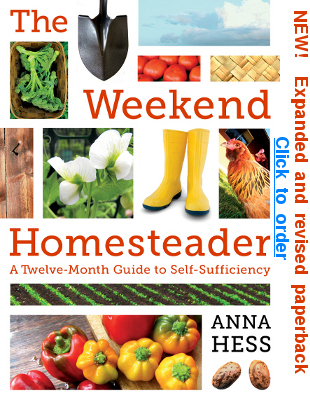
Uses for free biomass
 On a homestead, there's a nearly
unlimited need for compost, mulch, and
bedding for animals. But which type of biomass should be used
where? The characteristics below will help determine each
material's best use in your garden.
On a homestead, there's a nearly
unlimited need for compost, mulch, and
bedding for animals. But which type of biomass should be used
where? The characteristics below will help determine each
material's best use in your garden.
In the July
volume of Weekend Homesteader, I explained how a material's
carbon to nitrogen ratio (C:N ratio) determines its usefulness as mulch
or compost. The short version is:
Materials (like manure) that are high in nitrogen compost quickly and feed your plants within the first year. A C:N ratio of 30:1 is found in high quality compost. It's possible to have too much nitrogen in some biomass to apply it directly to your garden without composting, so materials like chicken manure (C:N of 8:1) are better used to heat up a compost pile.
Materials (like wood chips) that are high in carbon compost slowly and work better as mulch. A C:N ratio of 60:1 is too low in nitrogen to apply directly to your garden even as a mulch until allowed to compost for a year or more.
Another factor to consider when deciding what to do with scavenged
biomass is the presence of seeds. Seed-free biomass --- like
coffee grounds --- can be applied straight to the garden, but if you
use seedy grass clippings as mulch, you'll be sorry. I made the
latter mistake a few years ago and ended up with a massive weeding job
when the mulch sprouted a lawn around the roots of my sweet corn.
 But don't turn up your nose at uncomposted manure or other potentially
seedy biomass --- there are several ways to make good use of the
materials without creating a weeding problem. If you've got the
time, you can simply compost them. A well-build compost pile will
get so hot inside that it will kill any weed seeds, allowing you to use
the result on your garden with impunity. Another alternative is
to lay the seedy materials on the ground as the base of a kill mulch,
in which case the seeds will never sprout. (See the May
volume of
Weekend Homesteader for more information on kill mulching.)
Finally, if you have chickens, your flock will love picking through
weedy biomass on the floor of their coop, mixing in their high nitrogen
droppings to create stellar compost.
But don't turn up your nose at uncomposted manure or other potentially
seedy biomass --- there are several ways to make good use of the
materials without creating a weeding problem. If you've got the
time, you can simply compost them. A well-build compost pile will
get so hot inside that it will kill any weed seeds, allowing you to use
the result on your garden with impunity. Another alternative is
to lay the seedy materials on the ground as the base of a kill mulch,
in which case the seeds will never sprout. (See the May
volume of
Weekend Homesteader for more information on kill mulching.)
Finally, if you have chickens, your flock will love picking through
weedy biomass on the floor of their coop, mixing in their high nitrogen
droppings to create stellar compost.
The final problem you might run into when using free biomass is
poisons. Try to collect your grass clippings from uglier lawns
rather than from beautiful green swards treated with herbicides.
You might also want to steer clear of tree leaves grown downwind of
industrial facilities. Colored inks, especially those found on
paper heavier than newsprint, may occasionally contain heavy
metals. As long as you compost questionable biomass well, fungi
will deal with most of these chemical problems for you --- heavy metals
are the only issue that seems to be too much for fungi to handle.
Learn
about other fun, cheap, and easy fall projects in Weekend
Homesteader: October.
| This post is part of our Scavening Biomass lunchtime series.
Read all of the entries: |
Want more in-depth information? Browse through our books.
Or explore more posts by date or by subject.
About us: Anna Hess and Mark Hamilton spent over a decade living self-sufficiently in the mountains of Virginia before moving north to start over from scratch in the foothills of Ohio. They've experimented with permaculture, no-till gardening, trailersteading, home-based microbusinesses and much more, writing about their adventures in both blogs and books.
Want to be notified when new comments are posted on this page? Click on the RSS button after you add a comment to subscribe to the comment feed, or simply check the box beside "email replies to me" while writing your comment.
